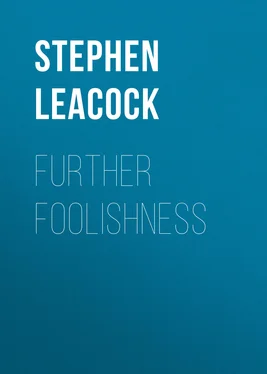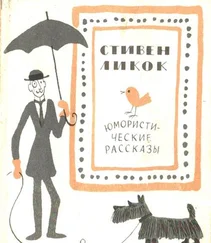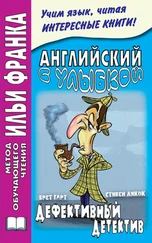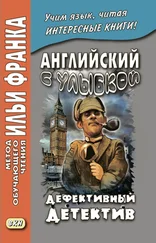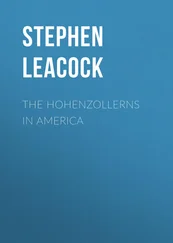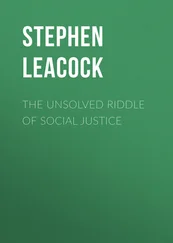Stephen Leacock - Further Foolishness
Здесь есть возможность читать онлайн «Stephen Leacock - Further Foolishness» — ознакомительный отрывок электронной книги совершенно бесплатно, а после прочтения отрывка купить полную версию. В некоторых случаях можно слушать аудио, скачать через торрент в формате fb2 и присутствует краткое содержание. Жанр: foreign_humor, Юмористические книги, foreign_antique, на английском языке. Описание произведения, (предисловие) а так же отзывы посетителей доступны на портале библиотеки ЛибКат.
- Название:Further Foolishness
- Автор:
- Жанр:
- Год:неизвестен
- ISBN:нет данных
- Рейтинг книги:5 / 5. Голосов: 1
-
Избранное:Добавить в избранное
- Отзывы:
-
Ваша оценка:
- 100
- 1
- 2
- 3
- 4
- 5
Further Foolishness: краткое содержание, описание и аннотация
Предлагаем к чтению аннотацию, описание, краткое содержание или предисловие (зависит от того, что написал сам автор книги «Further Foolishness»). Если вы не нашли необходимую информацию о книге — напишите в комментариях, мы постараемся отыскать её.
Further Foolishness — читать онлайн ознакомительный отрывок
Ниже представлен текст книги, разбитый по страницам. Система сохранения места последней прочитанной страницы, позволяет с удобством читать онлайн бесплатно книгу «Further Foolishness», без необходимости каждый раз заново искать на чём Вы остановились. Поставьте закладку, и сможете в любой момент перейти на страницу, на которой закончили чтение.
Интервал:
Закладка:
"Protect us!" said Yump. "Now he is rich!" and she poured oil and fat mixed with sand into the bread and beat it with a stick.
"He must get ready," they said. "He must buy clothes. Soon he will go to Moscow to the Teknik and become a wise man."
Now it so happened that there came one day to the door a drosky, or one-horse carriage, and in it was a man and beside him a girl. The man stopped to ask the way from Itch, who pointed down the post road over the plain. But his hand trembled and his knees shook as he showed the way. For the eyes of the man who asked the way were dark with hate and cruel with power. And he wore a uniform and there was brass upon his cap. But Serge looked only at the girl. And there was no hate in her eyes, but only a great burning, and a look that went far beyond the plain, Serge knew not where. And as Serge looked, the girl turned her face and their eyes met, and he knew that he would never forget her. And he saw in her face that she would never forget him. For that is love.
"Who is that?" he asked, as he went back again with Itch into the house.
"It is Kwartz, chief of police," said Itch, and his knees still trembled as he spoke.
"Where is he taking her?" said Serge.
"To Moscow, to the prison," answered Itch. "There they will hang her and she will die."
"Who is she?" asked Serge. "What has she done?" and as he spoke he could still see the girl's face, and the look upon it, and a great fire went sweeping through his veins.
"She is Olga Ileyitch," answered Itch, "She made the bomb that killed Popoff, the inspector, and now they will hang her and she will die."
"Defend us!" murmured Yump, as she heaped more clay upon the stove.
CHAPTER II
Serge went to Moscow. He entered the Teknik. He became a student. He learned geography from Stoj, the professor, astrography from Fudj, the assistant, together with giliodesy, orgastrophy and other native Russian studies.
All day he worked. His industry was unflagging. His instructors were enthusiastic. "If he goes on like this," they said, "he will some day know something."
"It is marvellous," said one. "If he continues thus, he will be a professor."
"He is too young," said Stoj, shaking his head. "He has too much hair."
"He sees too well," said Fudj. "Let him wait till his eyes are weaker."
But all day as Serge worked he thought. And his thoughts were of Olga Ileyitch, the girl that he had seen with Kwartz, inspector of police. He wondered why she had killed Popoff, the inspector. He wondered if she was dead. There seemed no justice in it.
One day he questioned his professor.
"Is the law just?" he said. "Is it right to kill?"
But Stoj shook his head, and would not answer.
"Let us go on with our orgastrophy," he said. And he trembled so that the chalk shook in his hand.
So Serge questioned no further, but he thought more deeply still. All the way from the Teknik to the house where he lodged he was thinking. As he climbed the stair to his attic room he was still thinking.
The house in which Serge lived was the house of Madame Vasselitch. It was a tall dark house in a sombre street. There were no trees upon the street and no children played there. And opposite to the house of Madame Vasselitch was a building of stone, with windows barred, that was always silent. In it were no lights, and no one went in or out.
"What is it?" Serge asked.
"It is the house of the dead," answered Madame Vasselitch, and she shook her head and would say no more.
The husband of Madame Vasselitch was dead. No one spoke of him. In the house were only students, Most of them were wild fellows, as students are. At night they would sit about the table in the great room drinking Kwas made from sawdust fermented in syrup, or golgol, the Russian absinth, made by dipping a gooseberry in a bucket of soda water. Then they would play cards, laying matches on the table and betting, "Ten, ten, and yet ten," till all the matches were gone. Then they would say, "There are no more matches; let us dance," and they would dance upon the floor, till Madame Vasselitch would come to the room, a candle in her hand, and say, "Little brothers, it is ten o'clock. Go to bed." Then they went to bed. They were wild fellows, as all students are.
But there were two students in the house of Madame Vasselitch who were not wild. They were brothers. They lived in a long room in the basement. It was so low that it was below the street.
The brothers were pale, with long hair. They had deep-set eyes. They had but little money. Madame Vasselitch gave them food. "Eat, little sons," she would say. "You must not die."
The brothers worked all day. They were real students. One brother was Halfoff. He was taller than the other and stronger. The other brother was Kwitoff. He was not so tall as Halfoff and not so strong.
One day Serge went to the room of the brothers. The brothers were at work. Halfoff sat at a table. There was a book in front of him.
"What is it?" asked Serge.
"It is solid geometry," said Halfoff, and there was a gleam in his eyes.
"Why do you study it?" said Serge.
"To free Russia," said Halfoff.
"And what book have you?" said Serge to Kwitoff.
"Hamblin Smith's Elementary Trigonometry ," said Kwitoff, and he quivered like a leaf.
"What does it teach?" asked Serge.
"Freedom!" said Kwitoff.
The two brothers looked at one another.
"Shall we tell him everything?" said Halfoff.
"Not yet," said Kwitoff. "Let him learn first. Later he shall know."
After that Serge often came to the room of the two brothers.
The two brothers gave him books. "Read them," they said.
"What are they?" asked Serge.
"They are in English," said Kwitoff. "They are forbidden books. They are not allowed in Russia. But in them is truth and freedom."
"Give me one," said Serge.
"Take this," said Kwitoff. "Carry it under your cloak.
Let no one see it."
"What is it?" asked Serge, trembling in spite of himself.
"It is Caldwell's Pragmatism ," said the brothers.
"Is it forbidden?" asked Serge.
The brothers looked at him.
"It is death to read it," they said.
After that Serge came each day and got books from Halfoff and Kwitoff. At night he read them. They fired his brain. All of them were forbidden books. No one in Russia might read them. Serge read Hamblin Smith's Algebra . He read it all through from cover to cover feverishly. He read Murray's Calculus . It set his brain on fire. "Can this be true?" he asked.
The books opened a new world to Serge.
The brothers often watched him as he read.
"Shall we tell him everything?" said Halfoff.
"Not yet." said Kwitoff. "He is not ready."
One night Serge went to the room of the two brothers. They were not working at their books. Littered about the room were blacksmith's tools and wires, and pieces of metal lying on the floor. There was a crucible and underneath it a blue fire that burned fiercely. Beside it the brothers worked. Serge could see their faces in the light of the flame.
"Shall we tell him now?" said Kwitoff. The other brother nodded.
"Tell him now," he said.
"Little brother," said Kwitoff, and he rose from beside the flame and stood erect, for he was tall, "will you give your life?"
"What for?" asked Serge.
The brothers shook their heads.
"We cannot tell you that," they said. "That would be too much. Will you join us?"
"In what?" asked Serge.
"We must not say," said the brothers. "We can only ask are you willing to help our enterprise with all your power and with your life if need be?"
"What is your enterprise?" asked Serge.
"We must not divulge it," they said. "Only this: will you give your life to save another life, to save Russia?"
Читать дальшеИнтервал:
Закладка:
Похожие книги на «Further Foolishness»
Представляем Вашему вниманию похожие книги на «Further Foolishness» списком для выбора. Мы отобрали схожую по названию и смыслу литературу в надежде предоставить читателям больше вариантов отыскать новые, интересные, ещё непрочитанные произведения.
Обсуждение, отзывы о книге «Further Foolishness» и просто собственные мнения читателей. Оставьте ваши комментарии, напишите, что Вы думаете о произведении, его смысле или главных героях. Укажите что конкретно понравилось, а что нет, и почему Вы так считаете.
